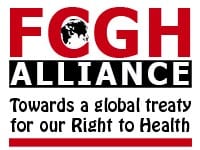 A Framework Convention on Global Health (FCGH) – a global treaty based in, and seeking to more fully give life to, the right to health, enhancing accountability and advancing health equity – is an idea that persists. You may well ask: A global treaty in the current political environment, with many governments and rapidly strengthening political parties hostile to the multilateral system, or perhaps determined to shape it to meet narrow national objectives? Much less a treaty based on human rights? A treaty committed to meaningful accountability as a decade-plus advance of authoritarianism globally undercuts democratic accountability?
A Framework Convention on Global Health (FCGH) – a global treaty based in, and seeking to more fully give life to, the right to health, enhancing accountability and advancing health equity – is an idea that persists. You may well ask: A global treaty in the current political environment, with many governments and rapidly strengthening political parties hostile to the multilateral system, or perhaps determined to shape it to meet narrow national objectives? Much less a treaty based on human rights? A treaty committed to meaningful accountability as a decade-plus advance of authoritarianism globally undercuts democratic accountability?
The moment for the FCGH, it has surely come and gone?
Au contraire. It is the very political dynamic of this era that adds to the purpose of the FCGH. Not only does its original rationale – unconscionable national and global health inequities and a lack of accountability to the right to health – persist, but the FCGH now also has an additional raison d’être: it could be a central tool in the mobilization against the narrow nationalism, xenophobia, anti-democratic tendencies, and rising inequality that mars much of our world today.
The FCGH embodies the principles that are under a dark cloud in much of the world: a commitment to an international order that values multilateral collaboration and that seeks to advance the common good and human rights for all; every bit as much accountability to the poorest person as to the wealthiest; a commitment to non-discrimination and human rights for all – including refugees and to migrants regardless of status. The FCGH is a treaty of philia and not phobia, of hope and not fear. The nationalistic populism that has risen in democracies including the United States, many countries of Europe, Brazil, and India, with echoes in such authoritarian states as Russia and China – the FCGH is a form of resistance against all of that.

If you believe that the world must not head down a path of narrowly defined national self-interest, then you are part of what here in the United States has come to be called The Resistance. The FCGH is part of that movement, a cooperative global venture to be undertaken for the good of humanity.
FCGH cannot be the only such a venture, to be sure. We need such a global initiative when it comes to climate change as well, for example – for the good of humanity and for innumerable other species of life on Earth. Indeed, the FCGH could serve as part of the response to climate change. After all, a healthy environment is an underlying determinant of the right to health; enhanced accountability to this right through the FCGH could become one prong of the response to climate change. So too could the resilient health systems that the FCGH could help engender, aiding adaptation efforts.
We cannot wait. Look to virtually every country and find vast health inequities that must be ended – between rich and poor, educated and unschooled, indigenous and non-indigenous populations, people with and without disabilities, people of different genders and orientations, women and men. Consider the differences in the possibilities of a long and healthy life that persist across countries, with life expectancies little more than 50 years in some countries, while they are more than 80 years in others.
We need to use every tool available to end such injustices – including a treaty, the most powerful instrument of international law. The need for such a treaty, now a little more than a decade since the FCGH was first proposed, remains as great as ever, as does its potential. It stands to create new possibilities for accountability and powerful new norms. Think of how the Paris Agreement on climate change has brought keeping the world’s temperature increase to within 1.5 degrees Celsius into the realm of the politically possible, however far necessary commitments remain. Consider how large, graphic warning labels have increasingly become the norm following the Framework Convention on Tobacco Control. What is more, the FCGH could strengthen a neglected area of the right to health, one of continually growing importance: adapting the right to health to a globalized world. And the FCGH could establish a formidable rights-based framework for health in the post-Sustainable Development Goals era, now little more than a decade hence. The treaty’s specific mechanisms could bring the human rights principles of equity, accountability, and participation nearer reality.
The dark clouds that have gathered over much of the world will not last. The forces committed to letting the sunshine of multilateralism and global solidarity, of democratic accountability and equality, will persist. The FCGH could be a point of mobilization – for individuals, for civil society, for social movements, and for countries that have valiantly resisted current trends and instead continued to insist on fairer and more justice societies at home and abroad.
As the political environment changes and the clouds lift, the FCGH can — and will — have its day. That moment could come sooner than we think. In many countries, elections brought to power governments committed to nationalistic populism, ones with authoritarian tendencies. While some of these countries have taken turns that damage their democratic possibilities, in others – like the United States – democracy continues. Elections can bring to power governments with visions and platforms consistent with universal human rights. And even where democratic norms have been weakened, where governments have appeared to tilt the electoral landscape to their insurmountable advantage, the people have proven that democracy can be stronger than dictatorial democrats – in The Gambia, in Maldives, in Malaysia.
The FCGH will have its day, but only if we begin now to mobilize behind it and its ideals. You can join this branch of the movement for human rights, global solidarity, and equality, spearheaded by the FCGH Alliance. To become a part, please contact the FCGH Alliance at: info@fcghalliance.org
I borrow the idea of the FCGH as a core part of global movement against nationalistic populism from the inspiration of Case Gordon of the IMAXI Cooperative. My thanks to Case.



